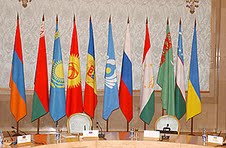Singly or Together: Integration vs. Autonomization in public opinion of the post-Soviet states
Igor Zadorin's report at the LCSR regular seminar
 Igor Zadorin (the head of ZIRCON research group, executive director of “Eurasian Barometer”) delivered a report “Singly or Together: Integration vs. Autonomization in public opinion of the post-Soviet states” (based on data of regular cross-country polling called “Eurasian Monitor”) at the regular seminar of LCSR on December 13, 2012.
Igor Zadorin (the head of ZIRCON research group, executive director of “Eurasian Barometer”) delivered a report “Singly or Together: Integration vs. Autonomization in public opinion of the post-Soviet states” (based on data of regular cross-country polling called “Eurasian Monitor”) at the regular seminar of LCSR on December 13, 2012.
During the period of April-May, 2012 “Eurasian Barometer” conducted research called “The Integration Barometer of Eurasian Development Bank” on the integration attitudes of the citizens of post-Soviet states. The project included national surveys in 10 CIS countries and Georgia.
The objective of this study is to measure the degree of economic and cultural closeness of the CIS countries and Georgia with other states of the world divided into 3 groups: republics of the former Soviet Union (except the Baltic States), countries of the European Union, and influential states in the rest of the world (like USA and China).
The scholars did not use general questions about integration as foreign policy discourse is not the issue of current interest in the daily life of the individual, and fluctuations in mood significantly affected by the current news flow. In-depth study was conducted to measure the attraction between two countries, operationalized into more understandable questions about the products which individuals prefer to buy, where they prefer to receive education, where to go on holidays, etc.
The researchers concluded that citizens of Armenia, Belarus, Moldova and Central Asian countries (Tajikistan, Uzbekistan, Kyrgyzstan) are more interested in integration with other countries in the post-Soviet region. Moreover, the proportion of those who are interested in the integration with the post-Soviet region in the countries of Central Asia is very high among the older generation.
Georgia and Armenia are orientated on the other countries but the post-Soviet states. Georgia is orientated on the integration with USA.
Autonomy (unwillingness to integrate with other countries) is most pronounced at Russia and Ukraine. In these two countries interest is directed towards the EU only. The correlation with country development indicators (GDP, HDI and net migration rate) showed that countries where the life conditions are comparatively good do not want to unite with the the states with worse life conditions. Poor countries such as Tajikistan or Uzbekistan, by contrast, show high interest in integration with the post-Soviet states.
In general, Russia has highly negative attitudes towards the relations with the other countries of the former Soviet Union. However, three countries, Russia, Ukraine and Belarus form the core of the mutual attraction. Especially strong bonds are found between Russia and Belarus.
Finally, Igor Zadorin focused on the problem of differences between the political coalition plans and citizens attitudes. Russia, Kazakhstan and Belarus are the engine of integration of the post-Soviet space; and politicians are orientated on the countries reconnection.But among the population there is lack of enthusiasm to join the post-Soviet countries.Ukraine and Russia as the most promising countries would not want to share their success with the less developed states.
Political elites do not take the attitudes of citizens into account, and it may lead to potential risks. The intentions of elites will diverge with aspirations of the population; and negative experience of the European Union will be repeated. In order to identify potential risks, participants of the project decided to add information on elites in the next wave of research: elite groups survey will be conducted in all 11 countries. It is planned to identify the risks of Eurasian integration - whether they exist, and if they do, what kind of risks we may face.
by Julia Savinkova
